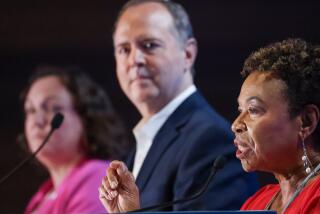Fong Says Terrorism Is Key Issue
- Share via
SAN FRANCISCO — International terrorism will be the war of the 21st century, U.S. Senate candidate Matt Fong predicted Monday, urging in a campaign speech for an extensive military buildup.
Speaking in San Francisco to members of the Commonwealth Club, Fong, a Republican, said that instead of breathing “a collective sigh of relief” when the Cold War ended, as evidenced by the massive defense cuts that followed, the United States should have been planning for the next battleground in global aggression.
“This state of euphoria blinded us. . . . We failed to recognize that a dangerous brand of fanaticism and radical fundamentalism that had lurked under the surface in so many parts of the world was about to bloom,” he said.
The deadly nerve gas released in the Tokyo subway in 1995, efforts by small countries to buy long-range missiles and other international developments should be taken as warning sirens, he said.
Fong, a lieutenant colonel in the U.S. Air Force Reserve, used the occasion to issue a six-point plan for rebuilding the national defense system, pausing occasionally to blame Democrats--and his Democratic opponent, Sen. Barbara Boxer--for gutting defense during the past decade.
But when asked how he would finance his plan, Fong walked a tightrope.
On one hand, a consistent part of Fong’s platform is a tax cut, so he insisted that better defense would not mean higher taxes. On the other, he said, “National security is not something I think we can be cheap about. . . . How much is it worth to save an American city? A lot.”
The trick, he said, will be persuading the public to make a new buildup a priority. “Funding has always come from the American people, as long as the American people think it’s worthwhile,” he said.
Fong’s delivery Monday was typically cool and calm, although he veered briefly into his post-primary quest to show his human side. He began his speech by talking about his first job--as a tour guide in San Francisco’s Chinatown--and how well it prepared him for the Senate race.
“You didn’t get paid much so you had to really focus on getting tips,” he said to scattered laughter. “That’s how I deal with my fund-raising.”
Money is among Fong’s largest obstacles. At the end of June--the last reporting period--Boxer had $3.9 million on hand, while Fong had just $215,000. However, a recent poll showing the two candidates neck-and-neck is expected to boost his fund-raising capabilities.
Otherwise, Fong strayed from his defense theme Monday only in response to questions. He suggested that Boxer’s relative silence on the Clinton-Lewinsky issue could be because “she’s a member of his [the president’s] family”--part of Fong’s continued effort to link her to Clinton. (Boxer’s daughter is married to Hillary Rodham Clinton’s brother.)
He also urged minorities to view the Republican Party as the “party of Lincoln . . . the party of opportunity.”
If Martin Luther King Jr. were alive today, Fong said, he would probably agree that equity means ensuring that everybody has a financial stake in the nation.
“Today’s civil rights movement should be or would be, if he were here . . . about how to own that bus, how to own that lunch counter,” he said.
Outlining his defense plan, Fong said the country needs missile and biological or chemical warfare defense systems. He also advocated the stockpiling of antibiotics, updated quarantine procedures and development of a system of early warning sensors.
“It doesn’t take much to put some sarin gas . . . into a crop duster and fly across a city and wipe out a couple hundred thousand people,” he said.
In addition, he said the antiballistic missile treaty embraced by the Clinton administration “should be sent to the trash heap of history” because it is based on the now-defunct standoff between the U.S. and the former Soviet Union.
According to Fong, the U.S. also should:
* Reverse the slide in defense budgets and mandate that armed services missions “should be military, not peacekeeping.”
* Restructure military pay and benefits to provide “decent and livable wages” pegged to the cost of living where troops are stationed.
* Improve intelligence-gathering capabilities worldwide, including ground-level resources to create “an early warning system against fanatics and despots.”
* Remove control over export of sensitive technologies from the hands of “political appointees in the Department of Commerce who seem to consider factors other than the national security interest of the United States in making their decisions.”
* Create a consistent foreign and defense policy emphasizing that threatening conduct “will be punished harshly.”
A Commonwealth Club member asked: Would Fong use the U.S. military to intervene in extreme cases of human rights abuses, such as the 1994 Rwandan genocide?
While he believes the U.S. has the responsibility to help protect the world from atrocities, Fong said cost has to be considered.
“Do we have the mandate to protect . . . everybody?” he asked. “We don’t.”
More to Read
Get the L.A. Times Politics newsletter
Deeply reported insights into legislation, politics and policy from Sacramento, Washington and beyond. In your inbox twice per week.
You may occasionally receive promotional content from the Los Angeles Times.










